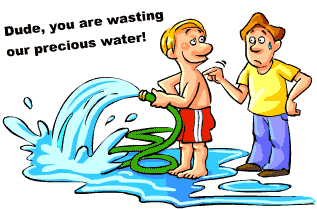In the last one
month we have witnessed a total of three extremely disturbing events – (1)
typhoon Haiyan that wreaked havoc through the Philippines, (2) The sudden
flooding of Riyadh and (3) the tornado that struck Illinois.
As I sat staring
at the partially filled lake outside my balcony, I began to wonder as to how
all this is connected. All the three places were of special significance to me
as my cousin brother lives with his wife in Illinois, another cousin sister
lives with her family in Manila and in Riyadh I have a host of family and
friends. Typhoons aren't a new phenomenon in the Philippines this time of the
year – but a typhoon of this magnitude scares me! A cloud burst in Riyadh makes
me laugh – I couldn't believe it the very first time I read it (and thought it
was faking news!). Tornadoes aren't new to Illinois – but this one was
remarkably different.
The best way to
understand the behavior of weather systems around the world is to look at the
record breaking temperatures that were seen this year alone. First let’s
examine the extreme lows that temperatures have hit!
- An extreme cold weather alert was issued in Toronto, Canada on February 16 and 17.
- The US witnessed an unusual cold wave that brought the Arctic cold front to their door steps with temperatures falling rapids and winds gushing at around 56 to 80 kmph! (35 to 50mph)
- In the Czech Republic the falling temperatures delayed the arrival of migratory birds that usually spend their summers here. In Pribram the temperature of -9.4 Celsius observed on March 24th broke the 1883 record by being 1.8 degrees lower!
- In Finland, this year’s usually warm March was replaced by an extremely cold month. It was also the coldest March in history!
- Northern France was hit by heavy snow beginning on March 11, with Meteo France warning of "dangerous weather of an exceptional intensity"
- On March 22nd Budapest came to a standstill when it recorded the heaviest snow in about 400 years! At other locations Hungary deployed tanks to rescue stranded tourists and citizens.
- Spain witnessed heavy snowing in the month of April!
- In Ukraine, the Kiev State Administration declared a state of emergency in the city on March 23 due to the deterioration of weather conditions causes by heavy snowfall, blizzards and snow-banks.
- Last month the United Kingdom braced the worst storm in years, with most of the country coming to a standstill.
- In China, the average January temperature became the lowest recorded in the last 28 years. About a thousand ships were stuck in ice in Laizhou Bay, while 10,500 square miles of ice reportedly covered the surface of the Bohai Sea. China also reported 180,000 cattle deaths due to extreme temperatures by January 10th.
- New Delhi recorded the lowest January temperatures in 44 years, while in the state of Uttar Pradesh schools remained closed till January 12th.
- Seoul the capital of South Korea recorded -16.5 degree Celsius on January 3rd, the lowest in 27 years.
- In June this year a heat wave struck South Western United States with Southern California experiencing a record high 50°C. This temperature is the highest ever recorded on Earth in the month of June!
- In July, Portugal experienced a week long heat wave with average temperatures touching 40°C and the peak temperature at 45°C.
- The UK recorded its highest ever temperature of 34.1°C on August 1st. Scientists and doctors claim that the record high temperatures over a period of weeks could have led at least 650 premature deaths!
- Shanghai recorded the highest temperatures in 140 years at 40°C
- Australia recorded the longest heat wave in history lasting a whopping 90 days!
The World’s weather pattern seems to
be fast changing. These changing weather systems will have a tremendous
influence on our lives - the agriculture on which we depend and the
infrastructure that supports us. Are we
prepared to brace these fast changes around us?
As you are reading this, two
heartbreaking events occurred at two different corners of the world. The
government of Bangladesh (the country to
be most vulnerable to climate change) unveiled its new plan of building 8
new coal powered power plants. The second blunder we witnessed was the banning
of peaceful protests against oil drilling by the United States!
Shocked?
You better be!









.jpg)